The 21st edition of the World Cup came to an end on Sunday, with France claiming their second title after defeating Croatia 4-2 in the final played at the Luzhniki Stadium in Moscow.
The tournament was characterized by new innovations including the introduction of VAR and the use of a fourth substitute in extra time. The World Cup also set new records for own goals scored, penalties awarded and penalties saved.
As with any other tournament, there were plenty of observations made and lessons learned. I present the top six observations the 2018 World Cup.
#1 Kylian Mbappe is the leader of a talented next generation of players

The World Cup is always a stage for the breakout of young players. Historically, players like Pele, Michael Owen, and Franz Beckenbauer have used the World Cup as a platform to launch themselves onto the global stage, while players like Podolski, Ribery, Schweinsteiger, Muller, Ozil and James Rodriguez have done so in recent editions.
The 2018 edition was no exception, witnessing standout performances from a plethora of young players. Jose Gimenez showed that he has come of age with his partnership for club and country with Diego Godin reaping dividends as the Uruguayan defence was an almost impregnable rock and the 23-year-old scored a vital late winner in his country's opening game against Egypt.
Rodrigo Bentancur of Uruguay was also another impressive youngster, with the 21-year-old showing great composure in the heart of Uruguay's midfield, World Cup winner Benjamin Pavard was one of the standout right-backs of the World Cup and the 22-year-old scored a contender for goal of the tournament with his exquisite strike from outside the box against Argentina.
There were also impressive performances from 19-year-old Deportivo goalie Francis Uzoho in the Nigerian goal, while another teenager Hirving Lozano was arguably Mexico's standout player and scored the winning goal against Germany.
The best of the pick, however, has to be Kylian Mbappe. Long touted to be a future star of the game following his record-breaking debut season for Monaco, the current Golden Boy holder reemphasized that view with a breathtaking performance at the World Cup.
The 19-year-old PSG attacker churned out performances that belied his age and his change of pace and trickery was a thorn-in-the-flesh for many a defender who he came up against in the World Cup.
No teenager in history has had such an impact on the World Cup since the legendary Pele at 17 in 1958 and Mbappe equalled a number of his records in this World Cup. His brace against Argentina in the second round made him the first teenager since Pele to score two in a World Cup match and his spectacular goal from outside the box against Croatia in the final meant he became the first teenager to score in a final since (you guessed right....) Pele in 1958).
Mbappe was deservedly named Young Player of the Tournament and it was symbolic that his standout performance came on the same day that Messi and Ronaldo got eliminated. This World Cup showed that the next generation of players are ready to take over the world stage, and if he can continue with his early career promise, then Mbappe would undoubtedly be the best player for some years to come.
#2 Croatia was the surprise package of the tournament
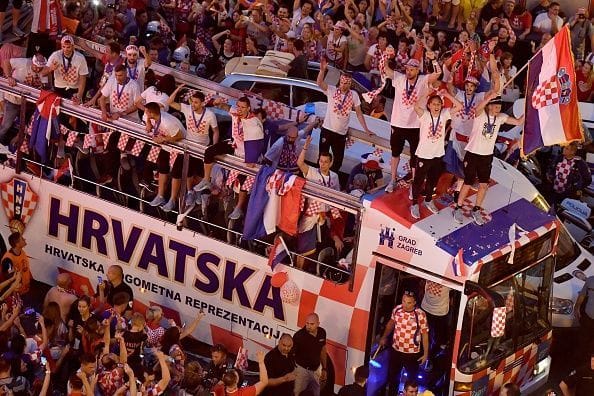
This current group of Croatian players is widely regarded as the best in their nation's footballing history and referred to as the 'Golden Generation'.
While that term is oft overused in sports, and those classified by it usually fail to reach the heights expected (just ask England), this team of Croatian players led by influential skipper Luka Modric achieved something special by getting to the final and recording their country's best ever World Cup finish.
There had been a weight of expectations in the last few tournaments for Croatia to make a stamp on international football in the way that the 1998 World Cup Golden Boot winner Davor Suker did by leading his nation to an eventual third-place finish at their debut appearance at the World Cup.
However, those expectations had been largely dashed; they failed to make it out of the group stage in Brazil four years ago and were not clinical enough in their round of 16 Euro exit at the hands of Portugal two years ago.
Their preparation for this tournament was marred by controversies surrounding corruption allegations and with one qualification match remaining, their appearance at the World Cup was not guaranteed, with coach Zlatko Dalic replacing sacked Ante Cacic last October and securing a playoff spot on the final day.
Qualification was achieved with a 4-1 aggregate victory over Greece in the playoffs, but despite an impressive array of individual talents, not much was expected from Croatia as they were handed what was considered by many to be one of the toughest draws of the World Cup group stages containing favourites Argentina, giant slayers Iceland (who topped them in World Cup qualification) and African heavyweights Nigeria.
Croatia garnered maximum points in the group with three wins, qualifying for the round of 16 for the first time since 1998 and were particularly impressive in their 3-0 demolition of Argentina.
They showed grit and determination to navigate their way around three extra-time knockout fixtures despite going behind first in each one of them, before their final day loss to France.
Despite their loss in the final, Croatia won the World over like their 1998 counterparts with their graciousness in defeat and on evidence of their reception back home, where over 500,000 people received them upon their return, they also won the hearts of their countrymen.
#3 VAR is a welcome addition to our beautiful game

With VAR having been test run by FIFA at the Confederations Cup last year and given a vote of confidence for use at this year's World Cup, a lot of fans were sceptical about it owing to the numerous controversies it courted in leagues where it was used last season.
However, what cannot be denied is that VAR helped correct a lot of errors which would otherwise have been unnoticed by the referee.
All final decisions ultimately rest with the match referee, although, VAR assists him/her where they feel a wrong decision has been made in any of the following incidents viz;
1) Awarding/cancellation of a goal
2) Penalty incidents
3) Mistaken identity
4) Red card decisions
A record total of 24 penalties were awarded in the World Cup with 11 of those coming after VAR review as defenders were punished for fouls they would have otherwise gotten away with were VAR not in use.
VAR made a lot of right calls during the World Cup, particularly in the group stages which ultimately went a long way in deciding the fate of the qualified teams and those that were eliminated.
Germany might well have qualified from their group had the referee's original decision for offside against Young-Gwon Kim's 90th-minute goal in their final group match stood and the Europeans went on to score an injury-time winner as they did against Sweden in their penultimate game.
VAR helped overturn the decision which turned out to be the right call leading to Germany's elimination.
Earlier, on matchday 1 in group F, VAR also came into play as Victor Claessen was fouled in the box against Korea but referee Victor Aguillar waved play on, only to reverse his decision after consultations with VAR. The resultant spot-kick was buried and ensured 3 points for Sweden, which aided in their qualification for the next round.
VAR also made the correct decision in overruling a penalty awarded to Neymar in Brazil's clash with Costa Rica as the PSG man had dived.
Iran's equalizer against Spain was also rightly chalked off for offside, failing which Iran might have gotten a point and the dynamics of qualification in group B would have been changed.
On the last day of the World Cup group stage, Senegal became the first ever country to be eliminated from the World Cup due to the fair play tiebreaker after they had finished level with Japan through the first four tiebreakers but things might have been different were it not for VAR.
Heading into their final group match in the second spot and needing just a draw against Colombia to go through, the Teranga Lions seemed to have been handed a lifeline when Sadio Mane was adjudged to have been felled in the box by Davidson Sanchez with the referee pointing to the spot.
On review with VAR, however, the decision was overturned and Colombia went on to squeeze a 1-0 victory and qualify for the next round at the expense of Senegal which might not have been but for the interference of VAR.
However, despite all these.......
#4 VAR still does not answer all the questions
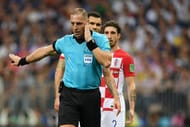
Despite all the gains made by the use of VAR at this year's World Cup, it still accrued its fair share of controversy, none bigger than in the final where Argentine referee Nestor Pitana decided to penalize Ivan Perisic for handball in the box after VAR review.
Coach Zlatko Dalic felt aggrieved by the referee's decision and he was not alone, as a major debate raged online by pundits and fans alike about the veracity of the penalty with there being an almost even split in opinion for and against the awarding of the penalty.
There were also other controversies earlier on in the tournament. Nigeria exited the World Cup after a late Marcos Rojo goal gave Argentina a 2-1 victory ensuring their qualification, but the Africans left with a bitter taste in their mouth after what they felt was an unjust decision by referee Cuneyt Cakir not to award a penalty for a handball by Marcos Rojo despite VAR review.
The ball appeared to have hit Rojo's hand after coming off his head and was deemed unintentional by the referee. However, critics pointed to the penalty awarded to Iran after VAR consultation when Sardar Azmoun nodded the ball against Cedric Soarez' arm, referring to it as double standards.
Also, Sweden's Marcus Berg appeared to have clearly been fouled by Jerome Boateng of Germany in the box but the referee waved play on without consulting VAR in an eventual 2-1 loss for the Swedes. Swedish outrage would understandably have been more had they not qualified to the second round.
Mitrovic was denied a clear penalty after being hauled down in the box in Serbia's clash with Switzerland. The Swiss would eventually win the game 2-1 and qualify ahead of Serbia and the Eastern Europeans can be forgiven for wondering over the effectiveness of VAR.
Another VAR controversy arose in the match between Brazil and Switzerland as the Samba Boys were irate at what they perceived to be a push on Miranda in the build-up to Switzerland's equalizer, while Kane was told to stand up twice against Tunisia for a similar foul to that which earned Mandzukic a penalty for Croatia against Nigeria.
VAR helped amend a lot of refereeing errors, but as with most other tournaments where it was used before the World Cup, it still has some technical discrepancies particularly in referees' inconsistent decisions for similar offences.
#5 German football needs some overhauling
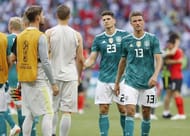
Germany became the third consecutive defending champions and fourth in five tournaments to be eliminated at the group stage and understandably, there have been widespread calls for changes to be made, with fans calling for the dropping of key players including Mesut Ozil and the resignations of the president of the German FA (DFB), Reinhard Grindel and team general manager Olivier Bierhoff.
The German national team enjoyed unprecedented successes between 1970 and 1990, winning the World Cup on two occasions(1974,1990), contesting a further two finals(1982,1986) and finishing third at the 1970 World Cup.
After the heights of those periods, the Germans rested on their laurels and came into the 1990's with a largely ageing squad, neglecting the promotion of players through the ranks and this culminated with a shock group stage exit at Euro 2000 as defending champions.
After that elimination, German football authorities scoured the world in search of the best football ideas and put in motion a plan which enforced all professional clubs across the top two divisions to have academies focusing on training and nurturing homegrown talent into world-class players.
A decade later, the first signs of the effectiveness of that plan was seen by the world as a largely youthful German team ran roughshod over much more experienced English and Argentine teams at the 2010 World Cup, before bowing out to eventual champions Spain at the semi-finals.
Exactly fourteen years later in Brazil, one of the products of that program, a 22-year-old Mario Gotze stroked home a 113th-minute winner to break Argentine hearts and give Germany its fourth World Cup title and first in 24 years.
The program is still effective as evidenced by the abundance of young German talent around Europe which led to Germany lifting their first ever Confederations Cup last year with a youthful team devoid of experience, beating much more seasoned veterans in Chile and Mexico to the title.
However, Joachim Low has shown an unwillingness to put faith in this new crop of players, preferring to stick with his experienced legs at the expense of youth.
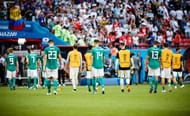
He inexplicably dropped the most in-form German of the just concluded season Leroy Sane, chose Manuel Neuer as his first choice goalkeeper despite the Bayern number one having not played a competitive game since September of last year owing to injury and stuck to a midfield comprising Khedira and Ozil when evidence suggests that the pair are probably past their primes.
While there is no denying that experienced players have a part to play particularly in mentoring the younger ones, every cycle must come to an end, and this generation no matter how talented they are have reached their nadir and it is time for Germany to usher in a different generation of players to lead them into their new era.
#6 Most of the favourites underperformed
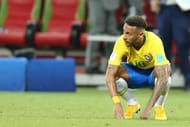
Brazil came into the tournament as red-hot favourites to claim an unprecedented sixth World title. However, the Samba Boys along with their star player Neymar flattered to deceive and were unconvincing in most of their matches before a crushing quarter-final defeat to Belgium.
Most of the smaller teams punched above their weight and showed that they were no respecter of status or pedigree, leading to some truly captivating and shocking group stage matches.
Germany were defending champions, but lost their first group game 1-0 to Mexico, narrowly won the second against Sweden by the whiskers and lost their final match against Korea DPR ultimately leading to their group stage elimination for the first time since 1938 and continuing the alarming sequence of World Cup defending champions being knocked out at the group stage (4 of the last 5 champions have suffered the same fate).
In Group B, Spain twice threw away a lead against Portugal to settle for a point, narrowly defeated Iran and trailed Morocco in their final group game; needing an injury-time Iago Aspas equalizer to earn a point. La Furia Roja would go on to lose against hosts Russia in the second round on penalties.
Argentina were also shambolic in their World Cup campaign. They were held to a 1-1 draw with tournament debutants Iceland in their group opener, before losing the plot completely in an emphatic 3-0 defeat to a Modric inspired Croatia and were 3 minutes away from elimination in the game against Nigeria before a Marcos Rojo winner handed them a lifeline.
La Albiceleste would be eliminated by France in the round-of-16 after a Kylian Mbappe brace inspired the French to a 4-3 victory en route their World Cup win.
